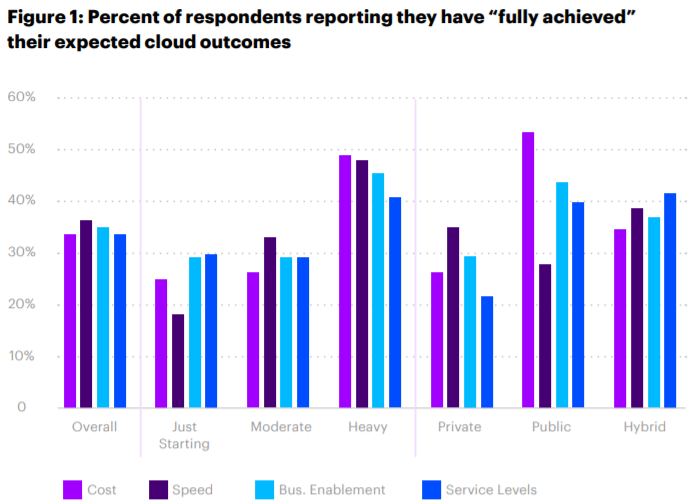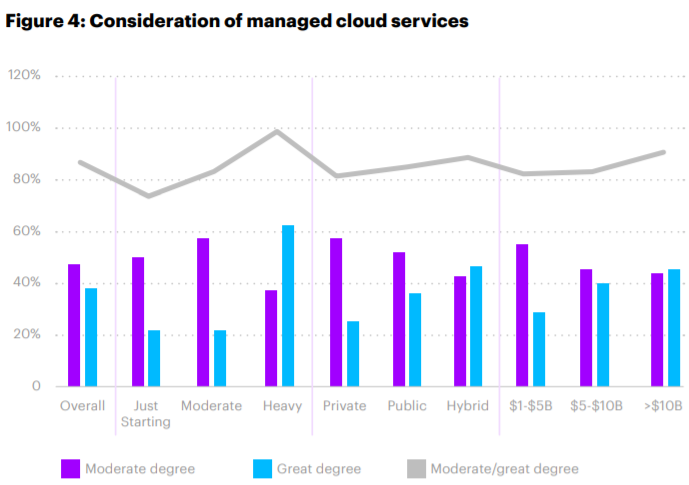Accenture: Full Value from Cloud Difficult to CaptureAccenture: Full Value from Cloud Difficult to Capture
Accenture says while most enterprises are satisfied with the cloud, few get full benefits.
June 6, 2019

Accenture, the professional services company, says in a new report that enterprises continue to migrate workloads and data into the cloud, but only a third are seeing the full benefits of their efforts.
Companies are finding that the move to the cloud is more complex than initially anticipated, and that such challenges as security, compliance, legacy infrastructure and a lack of cloud skills within their organizations are making it difficult to take full advantage of what the cloud can offer, the survey of 200 senior IT professionals discovered.

The Accenture report, Perspectives on Cloud Outcomes: Expectation vs. Reality, found that more than 90% of companies were satisfied with what they’ve gotten from the cloud overall, but two-thirds had yet to fully reach their expected outcomes in such areas as cost, speed, business enablement and service levels. With each category, 34-36 of IT pros said they had achieved the benefits they were aiming for.
Most of those surveyed said they would consider using managed cloud services as a way of addressing the challenges, particularly in the areas of access to cloud skills, lower costs and improved security.

Accenture’s Siki Giunta
“Third-party companies can help address the barriers to achieving benefits in the cloud,” Siki Giunta, managing director of cloud and infrastructure at Accenture, told Channel Futures. “It’s about providing the right skills, lower costs and measurable business value. Whether you’re an MSP, SI, VAR or any type of partner, the key takeaway is the fast pace of cloud innovation combined with the scarcity of resources enables a favorable outlook for all kind of ecosystem.”
Cloud adoption continues to grow among businesses, with Gartner analysts saying that spending on public cloud services this year will hit more than $214 billion in 2019, an increase of almost 18% over the $182 billion spent last year. In addition, many are adopting mulitcloud and hybrid cloud strategies, with workload automation vendor Turbonomic finding in a report this year that 84% of survey respondents were using more than one cloud provider.
But adopting a cloud strategy isn’t easy, with the Accenture report authors writing that “like most new technologies, capturing the intended benefits of cloud takes time; there is a learning curve influenced by many variables.”
Accenture’s Giunta said that while cost savings, speed to market, business enablement and improved service levels were the benefits enterprises were aiming for from the cloud, she added that “the stakes are now higher.”
“Our clients are asking for business transformation on top of data center services, so the objectives are now even more challenging,” she said. “Emerging technologies offer vast opportunities for innovation, so our clients now must add that to the mix of business transformation.”

As they use cloud technologies, their strategic goals are changing from issues of availability to more just-in-time services, Giunta said, adding that “24-by-7 capacity has been taken over by hyper user availability; for example, streaming can have a ton of capacity, but what about if millions of users all connect at the same time? … Cloud has brought a third dimension of satisfaction related to volume usability.”
The cloud model that enterprises are using impacts how well they …
… are able to achieve their expected goals, the Accenture report found. Those using private clouds report 90% satisfaction, while 92% of those using public clouds were satisfied. Organizations using a hybrid cloud model reported satisfaction levels of 95%. Private cloud users also trailed those using public and hybrid clouds in being “very satisfied” and fully achieving expected outcomes.
Giunta said enterprises will continue to adopt multicloud strategies, though added that skilled multicloud talent is scarce, so “enterprises are modeling their satisfaction to their ability to operate.”
Managed cloud services could be an answer to addressing challenges, the report found, noting that 87% of respondents said they would consider the use of such services. The opinion varied by how deep into the cloud and how large the organizations are. Of those in the early stages of adoption, 73% said they’d consider managed cloud services while almost all (99%) of those heavily in the cloud said they would. The largest companies were more inclined to use managed services.
About the Author
You May Also Like


